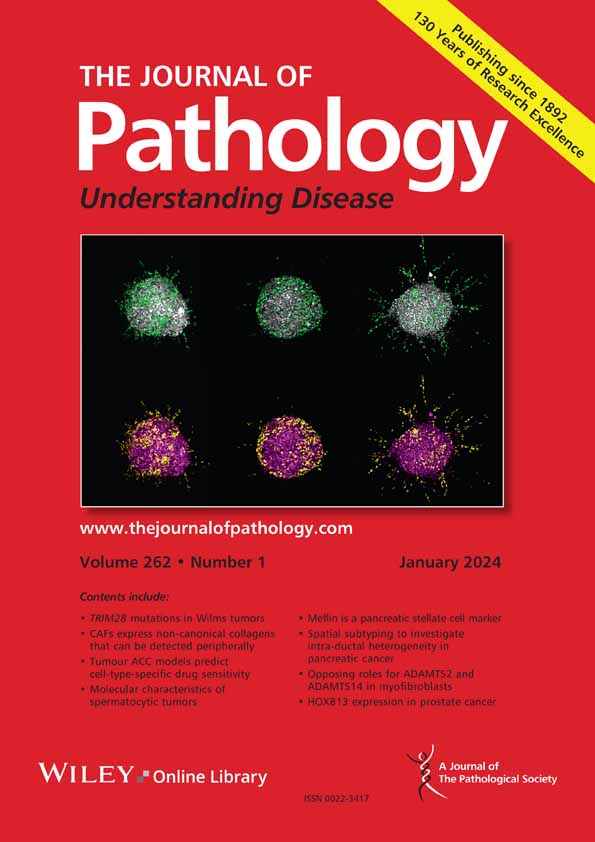下载PDF
{"title":"NPM1和FBL表达升高与前列腺癌的侵袭性和进展相关。","authors":"Sarina Saffarian, Ziwei Cai, Jordan Lam, Htoo Zarni Oo, Syam Somasekharan","doi":"10.1002/path.6447","DOIUrl":null,"url":null,"abstract":"<p>The nucleolus is a membrane-less body present in the nucleus of the cell. The nucleolus is mainly involved in ribosomal RNA (rRNA) transcription and ribosome biogenesis for protein translation. During cancer formation, nucleolar morphology is altered, and many nucleolar proteins are expressed at a higher level, leading to enhanced ribosome biogenesis and protein translation, which supports cancer aggressiveness, proliferation, migration, and invasion. In this study, we investigated the association of two nucleolar proteins, nucleophosmin (NPM1), and fibrillarin (FBL), with prostate cancer (PCa) aggressiveness and progression. We investigated their cellular localization and expression in different PCa patient tissue specimens and their role in regulating proliferation, migration, invasion, and nucleolar morphology. Our results indicate that NPM1 and FBL are present in the nucleolus of both PCa and noncancerous prostatic cells. The expression of NPM1 and FBL was enhanced in aggressive castration-resistant PCa (CRPC) and neuro-endocrine PCa (NEPC) patient specimens compared to hormone-naïve PCa (HNPC) patient specimens. The expression of NPM1 was enhanced in high-Gleason score PCa compared to low-Gleason score PCa. Silencing of NPM1 and FBL significantly reduced the proliferation, migration, and invasion of PCa cells without affecting noncancerous prostatic cells. Silencing of NPM1 and FBL also changed the morphology of nucleoli in both PCa and noncancerous prostatic cells, where NPM1 silencing fragmented the nucleoli and FBL silencing condensed the nucleoli. Our results suggest that NPM1 and FBL expression correlates with PCa aggressiveness and PCa cells may exhibit a unique dependence on NPM1 or FBL for PCa progression. © 2025 The Author(s). <i>The Journal of Pathology</i> published by John Wiley & Sons Ltd on behalf of The Pathological Society of Great Britain and Ireland.</p>","PeriodicalId":232,"journal":{"name":"The Journal of Pathology","volume":"267 1","pages":"56-68"},"PeriodicalIF":5.2000,"publicationDate":"2025-07-24","publicationTypes":"Journal Article","fieldsOfStudy":null,"isOpenAccess":false,"openAccessPdf":"https://pathsocjournals.onlinelibrary.wiley.com/doi/epdf/10.1002/path.6447","citationCount":"0","resultStr":"{\"title\":\"Elevated NPM1 and FBL expression correlates with prostate cancer aggressiveness and progression\",\"authors\":\"Sarina Saffarian, Ziwei Cai, Jordan Lam, Htoo Zarni Oo, Syam Somasekharan\",\"doi\":\"10.1002/path.6447\",\"DOIUrl\":null,\"url\":null,\"abstract\":\"<p>The nucleolus is a membrane-less body present in the nucleus of the cell. The nucleolus is mainly involved in ribosomal RNA (rRNA) transcription and ribosome biogenesis for protein translation. During cancer formation, nucleolar morphology is altered, and many nucleolar proteins are expressed at a higher level, leading to enhanced ribosome biogenesis and protein translation, which supports cancer aggressiveness, proliferation, migration, and invasion. In this study, we investigated the association of two nucleolar proteins, nucleophosmin (NPM1), and fibrillarin (FBL), with prostate cancer (PCa) aggressiveness and progression. We investigated their cellular localization and expression in different PCa patient tissue specimens and their role in regulating proliferation, migration, invasion, and nucleolar morphology. Our results indicate that NPM1 and FBL are present in the nucleolus of both PCa and noncancerous prostatic cells. The expression of NPM1 and FBL was enhanced in aggressive castration-resistant PCa (CRPC) and neuro-endocrine PCa (NEPC) patient specimens compared to hormone-naïve PCa (HNPC) patient specimens. The expression of NPM1 was enhanced in high-Gleason score PCa compared to low-Gleason score PCa. Silencing of NPM1 and FBL significantly reduced the proliferation, migration, and invasion of PCa cells without affecting noncancerous prostatic cells. Silencing of NPM1 and FBL also changed the morphology of nucleoli in both PCa and noncancerous prostatic cells, where NPM1 silencing fragmented the nucleoli and FBL silencing condensed the nucleoli. Our results suggest that NPM1 and FBL expression correlates with PCa aggressiveness and PCa cells may exhibit a unique dependence on NPM1 or FBL for PCa progression. © 2025 The Author(s). <i>The Journal of Pathology</i> published by John Wiley & Sons Ltd on behalf of The Pathological Society of Great Britain and Ireland.</p>\",\"PeriodicalId\":232,\"journal\":{\"name\":\"The Journal of Pathology\",\"volume\":\"267 1\",\"pages\":\"56-68\"},\"PeriodicalIF\":5.2000,\"publicationDate\":\"2025-07-24\",\"publicationTypes\":\"Journal Article\",\"fieldsOfStudy\":null,\"isOpenAccess\":false,\"openAccessPdf\":\"https://pathsocjournals.onlinelibrary.wiley.com/doi/epdf/10.1002/path.6447\",\"citationCount\":\"0\",\"resultStr\":null,\"platform\":\"Semanticscholar\",\"paperid\":null,\"PeriodicalName\":\"The Journal of Pathology\",\"FirstCategoryId\":\"3\",\"ListUrlMain\":\"https://pathsocjournals.onlinelibrary.wiley.com/doi/10.1002/path.6447\",\"RegionNum\":2,\"RegionCategory\":\"医学\",\"ArticlePicture\":[],\"TitleCN\":null,\"AbstractTextCN\":null,\"PMCID\":null,\"EPubDate\":\"\",\"PubModel\":\"\",\"JCR\":\"Q1\",\"JCRName\":\"ONCOLOGY\",\"Score\":null,\"Total\":0}","platform":"Semanticscholar","paperid":null,"PeriodicalName":"The Journal of Pathology","FirstCategoryId":"3","ListUrlMain":"https://pathsocjournals.onlinelibrary.wiley.com/doi/10.1002/path.6447","RegionNum":2,"RegionCategory":"医学","ArticlePicture":[],"TitleCN":null,"AbstractTextCN":null,"PMCID":null,"EPubDate":"","PubModel":"","JCR":"Q1","JCRName":"ONCOLOGY","Score":null,"Total":0}
引用次数: 0
引用
批量引用






 求助内容:
求助内容: 应助结果提醒方式:
应助结果提醒方式:


